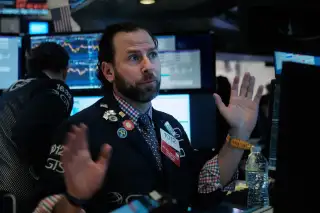The Dow Just Dropped 1,000 Points on New Coronavirus Fears. Here's What to Do If You're Worried

Stocks plunged on Monday following news the deadly coronavirus may be gaining a bigger foothold outside of China. While big market moves can be scary — especially when tied to disquieting health news — you shouldn’t let it rattle your investment plan.
The Dow Jones Industrial Average closed down 1,032 points, or 3.6%, on Monday. The drop followed a spate of coronavirus cases in Italy, South Korea and Iran that were announced over the weekend. Stock markets in Asia and Europe were also down sharply.
It's becoming clear the coronavirus outbreak may be more difficult to contain than initially hoped. And the economic toll, as health authorities curtail transportation and shutter factories and shops, could remain unclear for weeks. But if you have a smart investing plan, you should be able to ride it out, despite volatile days like Monday.
Here's what you need to know.
Why the Market Is Reacting
This isn't the first time the U.S. stock market has reacted to coronavirus fears, with certain industries such as airlines and hotels already showing weakness. Meanwhile, the Chinese stock market was hit even harder, with stocks down as much as 10% in late January, although they have since regained much of that lost ground.
Still, U.S. investors, lulled by low unemployment and strong corporate profits, had largely shrugged off the fears — until now. One reason is Apple, one of the market's most valuable and closely watched companies. Last week, Apple said it would no longer hit its quarterly revenue target after coronavirus curtailed its ability to make iPhones in China and also hurt sales of its products to Chinese consumers.
Another reason investors are suddenly paying attention is the apparent spread of the virus beyond China, particularly to Europe. While isolated cases have appeared in the U.S. and elsewhere for weeks, the recent uptick in several countries suggests authorities are having trouble containing the virus.
What's more, the fact it appears to be taking hold in Europe could mean more significant disruptions for the U.S. economy. Overall, large-cap U.S. stocks derived around 38% of their total revenue from oversees in 2018, according to Morningstar. While about 8% came from China, roughly 14% came from Europe.
Why You Shouldn't Overreact
While Monday's stock market slide is the biggest of the year so far, dominating headlines on many news sites, you should consider it in context.
The Dow remains at 27,961. While that's nearly 4% below where it was on Friday — a jarring drop in a few hours of trading — that's just a bit below where the market was at the start of the month. The Dow began February at 28,256. Turn the clock back just a bit further and the market looks even better. It was only on Nov. 16 that the Dow closed above 28,000 for the first time ever. Indeed, even factoring in Monday's big decline, investors are still up about 8% in the past 12 months.
Another thing you need to keep in mind is that while the market can react quickly to bad news or economic uncertainty, those reactions can be short-lived. Earlier this month, Dow Jones Market Data looked at how the market reacted in the medium term to previous health scares during the past 40 years, such as SARS in 2003.
Coronavirus’ potential economic effects are frequently compared to SARS, and the market ultimately brushed off those worries. Large-cap stocks were up about 14% six months after news about the SARS outbreak first appeared and 21% a year later. The data tell much the same story for most of the dozen health scares Dow Jones examined.
What to Do Now
So what should you do in response to Monday's global sell off? The answer, like always, is probably nothing. Your investment horizon should be for the long-term. If you have money in the stock market, that means at least five or 10 years, if not decades, for savings stashed in a 401(k) or IRA. That should be plenty of time for your holdings to recover even if transportation and supply-chain disruptions spark a significant economic slowdown in certain parts of the world.
That said, you shouldn't necessarily be complacent either. If Monday's big drop put you into a cold sweat, maybe you should consider dialing back on your stock-market exposure and adding bonds. (A target-date fund like the ones we recommend as part of our Money 50 list of best mutual funds can help you find an age-appropriate mix.)
That's not because coronavirus is likely to send the stock market into spiral. But rather because, with stocks still near record highs — and valuations sky high too — you can assume that sooner or later the market is going to take a significant tumble. If you think you might really panic if the market fell 10% or 20%, it's better to take a small haircut today than a much bigger one in the midst of a real bear market.
You have less time to recover from missteps if you're on the cusp of retirement or are newly retired. Locking in big stock market losses during your first few years of retirement, at the same time you start to tap your savings to fund living expenses, can dramatically crimp your portfolio's earning potential in future years. Some experts advise that you fund your essential expenses through guaranteed income sources such as Social Security and a plain fixed income annuity, so you don't have to touch your stock portfolio for a while if the market crashes.
More from Money:
Money's 2020 Tax Survival Guide: What's New and How to Get the Biggest Refund
Small-Company Stocks Have Been Lagging the Market. Here's Why That Could Change Soon